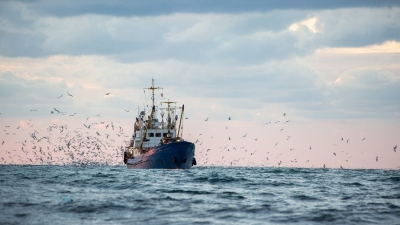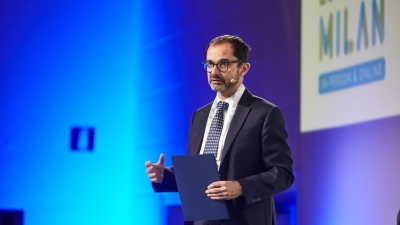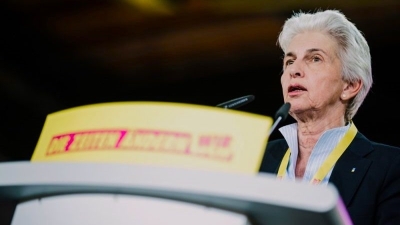Ukraine, Poland close to solving imports dispute, says Kyiv trade minister

As the EU moves to extend trade liberalisation with Kyiv, Ukraine’s trade representative Taras Kachka told Euractiv that talks with Warsaw will soon lead to safeguard measures to protect Polish farmers from the influx of Ukrainian agricultural imports.
Ukraine and Poland are working to tackle tensions on their shared border, where Polish farmers have staged blockades and dumped Ukrainian grain in recent weeks to protest against Ukrainian imports “flooding” their markets.
“We are very close to designing measures that will be tailor-made, temporary and helpful to restore the trust between all stakeholders,” Kachka told Euractiv in an interview on Thursday (7 March).
Speaking after the European Parliament’s trade committee (INTA) voted to extend Ukraine’s trade benefits until June 2025, Kachka said Kyiv was ready to shift to a more flexible EU-Ukraine trade framework that would take into account the specificities of some member states.
He said Ukraine was prepared “to tackle the interest of [its] neighbours,” acknowledging the concerns of farmers in Poland, as well as Bulgaria, Hungary, Romania, and Slovakia.
The European Commission’s proposal for trade liberalisation – the so-called autonomous trade measures (ATMs) – is to set an ‘emergency brake’ in case the influx of “sensitive” Ukrainian products (eggs, sugar, and poultry) surpasses the average import volumes in 2022 and 2023.
In the interview, Kachka welcomed the approval of the proposal by the European Parliament’s trade committee and went a step further in opening the door to revising EU-Ukraine trade relations.
“We are ready for the necessary rules or instruments in our bilateral trade [agreement],” he said, “in order to balance” regional and EU impact of trade.
Kachka called for a distinction to be made between the “regional situation”, i.e. the impact of Ukrainian imports on the frontline countries, and the demand for these imports in the EU’s internal market as a whole and other member states.
His comments indicated an easing of tensions between Kyiv and Warsaw, which reached critical levels last month as Ukraine accused Polish farmers of “stigmatising” their food.
Asked about the unilateral bans on Ukrainian imports still in force in Poland, Hungary, and Slovakia, Kachka said that “in an emergency situation”, certain setbacks in trade policy were to be tolerated, but “not forever”.
Following the introduction of the regional bans in September 2023, Ukraine filed a lawsuit against the three member states at the World Trade Organisation (WTO). But Kachka said he was now speaking “from a different perspective” and wanted to find a solution regardless of “who is right [and] who is wrong”.
“We are not in a normal (…) trade dispute.”
Sensitive products
While the decision on safeguards for sensitive imports has been taken, talks on critical sectors are “not over”, Kachka told Euractiv.
He said there was a “delicate balance” in the proposed measures, considering what he called the “marginal” impact of Ukrainian exports on the EU market and the “legitimate concerns of the farming community”.
According to him, increased exports to the bloc had helped “balance” the EU market.
“[For sugar], we will reach the threshold in June,” he said, adding that with European production failing to meet demand, there would be a shortage of sugar, causing prices in the bloc to soar.
In the case of Spain, for example, he pointed out that Ukrainian maize exports are “at record levels because of really [high] demand”.
Russian imports
According to Kachka, market disruptions in frontline countries should be blamed on Russian agricultural exports to the EU.
“For certain products where Polish farmers are raising the most concerns, [there is] unnecessary competition from Russian products,” he said.
Ukraine is not alone in pointing the finger at Russia, as several Eastern European states have criticised imports from Moscow and called for an EU-wide ban.
After Latvia approved a ban on agricultural imports from Russia and Belarus in February, Polish Prime Minister Donald Tusk said he would push the European Commission to introduce EU-wide sanctions.
The Black Sea
Kachka said Ukraine was “easing [the] pressure on land borders” by restoring sea export routes.
Shipments in the Black Sea, a strategic area for global grain and oilseed exports, were halted by the Russian invasion of Ukraine in February 2022, increasing trade flows via land routes in Eastern Europe.
Now, Kyiv has brought grain and oilseed exports to the same levels as in March 2023, when the UN initiative was securing food trade through the Black Sea corridor.
In February 2024, 5.2 million tonnes of agri-food products exited Ukraine via the Black Sea routes, while 2.1 million tonnes exited via the so-called solidarity lanes, the Commission spokesperson for trade Olof Gill confirmed to Euractiv.
Ukraine and the CAP
Kachka spoke against the “rhetoric of EU farming associations” that confuse short-term and long-term situations, as the debate on trade measures is influenced by the assessed impact of Ukraine’s integration in “the future hypothetical Common Agricultural Policy” when Ukraine is still not in it.
The discussion on “future integration of Ukrainian agriculture in the internal market of the European Union will start in due course”, Kachka said, calling for dealing with trade issues first.
Responding to an analyst’s warnings of cereal black market sales between Ukraine and the EU, Kachka told Euractiv that Kyiv “is working to increase transparency in financial markets”.
“Starting from October 2023, a new system according to which you can only export if you are clear with taxes” is in place, Kachka said. “We are going to reinforce it, there might be some concerns, but we are working on this quite effectively”.
Read more with Euractiv




